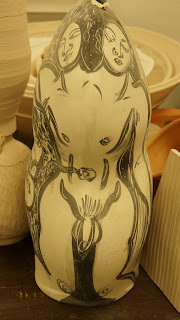I found a great book of poetry by memoir master Mary Karr (in this post here), and a good guest article by Keven Bellows on Marion Roach's blog here. Jill Bialosky's article on her memoir History of a Suicide and her contemplations about poetry versus memoir is here. I love this quote in particular from Bialosky:
Both poetry and memoir attempt to uncover what lies behind the unreasoning mask and rescue it into consciousness. The creation of both arts is reliant upon Keat’s ideas of negative capability, of being capable “of being in uncertainties, mysteries, doubts, without any irritable reaching after fact and reason.”These are all adult memoirists and poets, which is, in some ways was I was looking for.
I realized over time though that I had sort of overlooked the plethora of poetic biographies for children and teens out there. One example I used to use to teach middle schoolers is Poet Slave of Cuba (a biography). In terms of telling personal stories, Naomi Shihab Nye's collection What Have You Lost? is a wonderful tender collection of poems by children and young adults about real life loss.
In fact, it seems poetry is commonly used in younger reader literature, because it is construed as being simpler, more readable, more appeasing to kids. However, that can be deceptive. Intensity can pack a punch in poetry, even moreso than in prose (see Poet Slave).
In particular, Jacqueline Woodson's memoir, Brown Girl Dreaming, has been on my list since it came out a couple of years ago, and it is wonderful. Like Poet Slave, it deals with a difficult time filled with racism and struggle, in this case, the civil rights era in the south and north. Her lyrical verse makes it possible to depict difficult scenes - difficult for adults as well as kids! - and actually to reveal the simplicity of the logic that ruled - and still rules - racist thinking.
For instance, she speaks of going north with her family, moving from South Carolina to New York City, and how her mother begins to discipline their speech with switches:
We are never to say huh?ain't or y'allgit or gonnaNever ma'am -- just yes with eyes
meeting eyes enough
to show respect.
Don't ever ma'am anyone!The word too painful
a memory for my mother
of not-so-long-ago
southern subservient days...
The list of what not to say
goes on and on...
You are from the North, our mother says.
You know the right way to speak.
As the switch raises dark welts on my brother's legsOr this amazing short poem, which depicts going back to South Carolina after living up north:
Dell and I look on
afraid to open our mouths. Fearing the South
will slip out or
into them.
ghosts
In downtown Greenville,
they painted over the WHITE ONLY signs,
except on the bathroom doors,
they didn't use a lot of paint
so you can still see the words, right there
like a ghost standing in front
still keeping you out.
You were born in the morning, Grandma Georgiana said.
I remember the sound of the birds. Mean old blue jays squawking. They like to fight, you know!...That's how I know you came in the morning.That's how I remember.
You came in the late afternoon, my mother said.
Two days after I turned twenty-two.Your father was at work. Took a rush hour bus tryingto get to you.
You're the one that was born near night,my father says...
My time of birth wasn't listed
on the certificate, then got lost again
amid other people's bad memory.
Finally, she writes throughout about her journey of coming to writing. When she was very young, words were exceptionally hard for her, which had a sting because her sister excelled at everything (from "gifted"):
I am not gifted. When I read, the words twist
twirl across the page.
When they settle, it is too late.
The class has already moved on.
I want to catch words one day. I want to hold themAnd, of course, as a National Book Award winner, she has done just that.
then blow gently,
watch them float
right out of my hands.
If you are usually writing or reading in prose memoir forms, explore poetry - whether it is explicitly labeled memoir or not. Play with form, on large and small scale. See if you can find a way to accept the uncertainty and complexity of life with simple forms, in a way complex paragraphs and sentences cannot grasp.



































